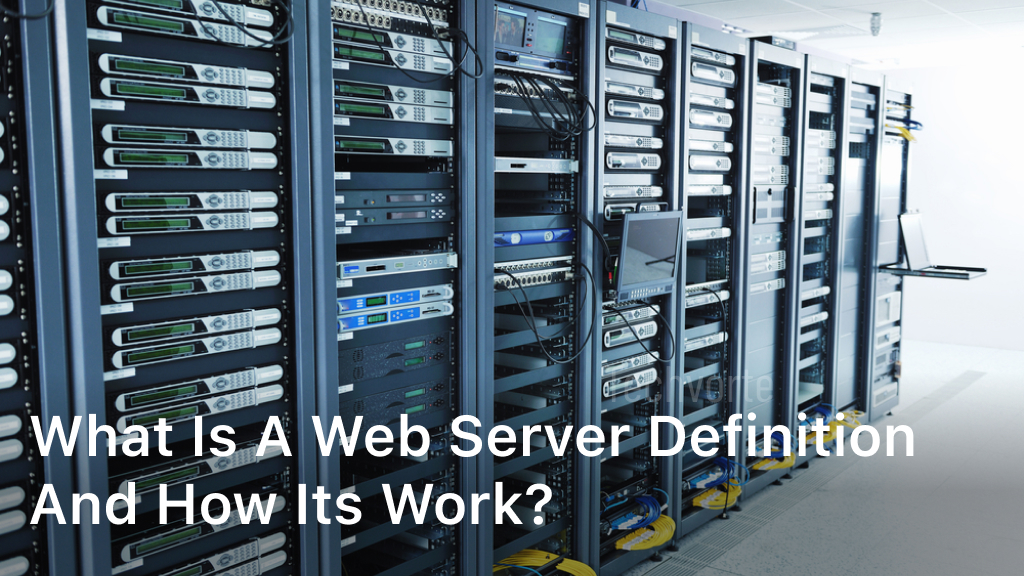As the internet has evolved over the years, it has become increasingly clear that web servers play a vital role in keeping it running. In simple terms, a web server is a software program or hardware device that processes requests from clients and delivers web content to them. But what is a web server definition, and how does it work?
A web server can refer to either the hardware or software components that enable websites and web applications to be accessed over the internet. When you type a URL into your browser, the web server retrieves the relevant files from its storage and delivers them to your browser for display. This process involves a series of steps that require the web server to respond to requests, manage connections, and process data.
So, if you’re wondering how web servers work, you’re in the right place. This article will provide you with a comprehensive understanding of web servers, including their definition, internal components, types, and functions. With this knowledge, you’ll have a better understanding of the vital role that web servers play in enabling the internet to function smoothly.
Understanding Web Servers

Web servers are the backbone of the internet. They serve web pages and handle requests from clients, such as web browsers, upon receiving a URL request. Understanding how web servers work is essential to developing, deploying, and managing web applications.
A web server functions by binding a socket to a specific IP address and listening for incoming HTTP requests. Once a request is received, the server then determines which resource the client is asking for and returns the appropriate response, either by retrieving the indicated file or dynamically generating content based on the request parameters.
Web servers can also manage client authentication, enforce security controls, and perform other functions such as caching and load balancing. In essence, they are the gateway between the client and the web application, handling requests and responses seamlessly behind the scenes.
By having a sound understanding of the role that web servers play in delivering web applications to clients, developers can make informed decisions regarding server configuration, optimization, and scaling. Furthermore, understanding web servers allows management and support personnel to diagnose and troubleshoot common issues related to web applications and their underlying infrastructure.
Components of a Web Server
A web server consists of various hardware, software, and protocols that work together to enable server functionality. The primary components of a web server include:
Hardware
The hardware component of a web server includes the physical equipment that comprises the server, such as the central processing unit (CPU), random access memory (RAM), hard disk drive (HDD), network interface card (NIC), power supply unit (PSU), and cooling system. These components determine the server’s processing power, storage capacity, and connectivity.
Software
Software is another integral part of a web server. It includes the operating system (OS), web server software, and programming languages. The OS handles basic server operations, while the web server software manages requests and delivers web pages to clients. Popular web server software includes Apache, Nginx, and Microsoft IIS, and the most commonly used programming languages are PHP, Python, and Ruby.
Protocols
Protocols are standardized rules that allow web server components to communicate with each other and external clients. Some essential web server protocols include:
- HTTP: Hypertext Transfer Protocol is used for transferring data between web servers and browsers.
- HTTPS: Hypertext Transfer Protocol Secure encrypts data transmitted between web servers and clients for enhanced security.
- FTP: File Transfer Protocol is used for uploading and downloading files to and from the server.
- SMTP: Simple Mail Transfer Protocol is used for sending email from a server to other servers or email clients.
Together, these hardware, software, and protocols form the basis of a web server’s capabilities, delivering web pages to users and enabling online communication and exchange of data.
Types of Web Servers:
Web servers are the backbone of the internet, and there are several types of servers available. Each type has its unique features and use cases. The following are the most common types of web servers:
1. Apache:
Apache is the most widely used web server software. It is known for its stability and flexibility, making it a popular choice for serving a wide range of websites, including complex and high-traffic sites. Apache is open-source software, meaning that users can modify its code to suit their specific needs.
2. Nginx:
Nginx is known for its lightweight and high-performance design, making it an excellent choice for serving static content and handling a high volume of simultaneous connections. It is often used as a reverse proxy server, load balancer, and HTTP cache.
3. Microsoft IIS:
Microsoft IIS (Internet Information Services) is a web server software designed for use with Microsoft’s Windows operating system. It is known for its excellent performance and scalability, making it an ideal choice for corporate environments that use Windows-based systems.
Other types of web servers include Lighttpd, Google Web Server, and Caddy Server, among others.
Choosing the right web server software depends on several factors, such as website requirements, traffic volume, and server specifications. However, regardless of the type of web server chosen, it is crucial to keep them up-to-date with the latest security patches and updates to ensure optimal performance and protection from potential threats.
Web Server vs. Web Hosting
Although often used interchangeably, web servers and web hosting are two distinct components of delivering websites to users. A web server refers to the software and hardware infrastructure that hosts and serves websites to clients upon request. On the other hand, web hosting refers to the service of providing storage, connectivity, and other resources to enable websites to run and be accessible on the internet.
Web servers act as the middleware that connects the user’s device to the content stored on the web host’s server. When a user requests a specific website through their web browser, the web server receives the request and retrieves the website’s data from the web host’s storage. The server then sends the data back to the user’s device, which compiles it into the website that the user sees on their screen.
It is important to note that web hosting is dependent on web servers. Without a web server, web hosting services would be rendered useless as there would be no means of serving website data to users. Conversely, without web hosting, web servers would have nowhere to store website data and no way to connect to the internet.
Therefore, while they serve different purposes, web servers and web hosting are interdependent, working together to deliver the websites that we access every day.
Conclusion
In conclusion, web servers are the backbone of the internet, responsible for delivering web pages to users worldwide. By understanding the definition, functions, components, and types of web servers, one can gain essential knowledge about the technology that powers the world wide web. Furthermore, web servers and web hosting are interconnected, with web servers providing the necessary infrastructure for web hosting companies to deliver websites to end-users.
As the internet continues to grow and evolve, web servers will play an increasingly critical role in shaping its future. With the ability to handle vast amounts of data and traffic, web servers enable businesses, organizations, and individuals to reach global audiences and facilitate the exchange of information on an unprecedented scale.
Whether you are a web developer, IT professional, or simply a curious learner, understanding web servers is essential to navigating the digital landscape. By grasping the fundamentals of web servers, one can unlock the power of the internet and utilize its vast potential to achieve their goals.
Thank you for taking the time to read this article about web servers. We hope you have gained valuable insights and knowledge that will serve you well on your digital journey.
FAQ
What is a web server?
A web server is a computer program or hardware device that hosts websites and delivers web pages to clients upon request. It stores, processes, and delivers the content of web pages to users who access them through a web browser.
How does a web server work?
Web servers work by receiving and processing HTTP requests from clients, typically web browsers. They then retrieve the requested files, such as HTML, CSS, and images, and send them back as HTTP responses to be displayed in the browser. Web servers use protocols like HTTP to communicate with clients and deliver web content efficiently.
What are the key components of a web server?
The key components of a web server include hardware, software, and protocols. Hardware refers to the physical server machine, which can be a dedicated server, a virtual server (VPS), or a cloud server. Software comprises the server application, such as Apache or Nginx, which handles incoming requests and serves web pages. Protocols, such as HTTP and HTTPS, enable the communication between the server and clients.
What are the different types of web servers?
There are various types of web servers available, each with its own unique features and use cases. Some popular web server software includes Apache, Nginx, and Microsoft IIS. Apache is a widely used open-source web server, known for its flexibility and cross-platform compatibility. Nginx is renowned for its high performance and scalability, making it popular among high-traffic websites. Microsoft IIS is a web server designed specifically for Windows-based systems.
How is a web server different from web hosting?
A web server and web hosting go hand in hand, but they are not the same thing. A web server refers to the software or hardware that serves web pages, while web hosting is a service that provides the infrastructure, storage, and network connectivity to host websites on a server. In other words, web hosting encompasses the server and additional services like domain management, email hosting, and database support to make websites accessible on the internet.





